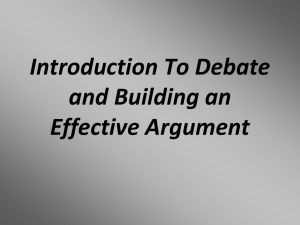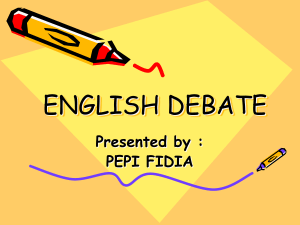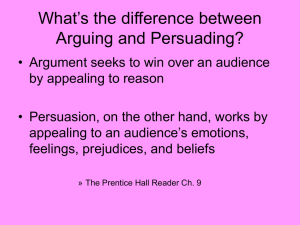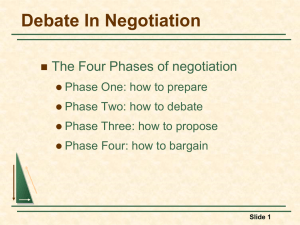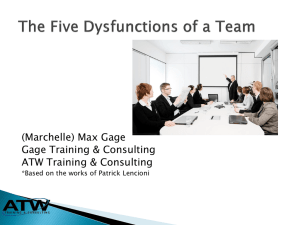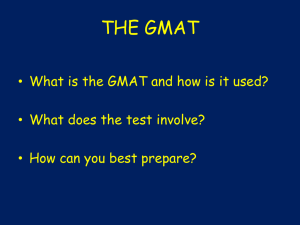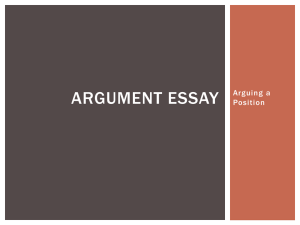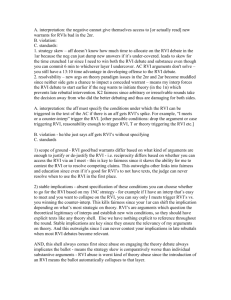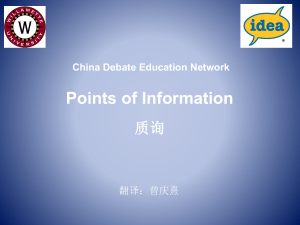Theory Lecture
advertisement
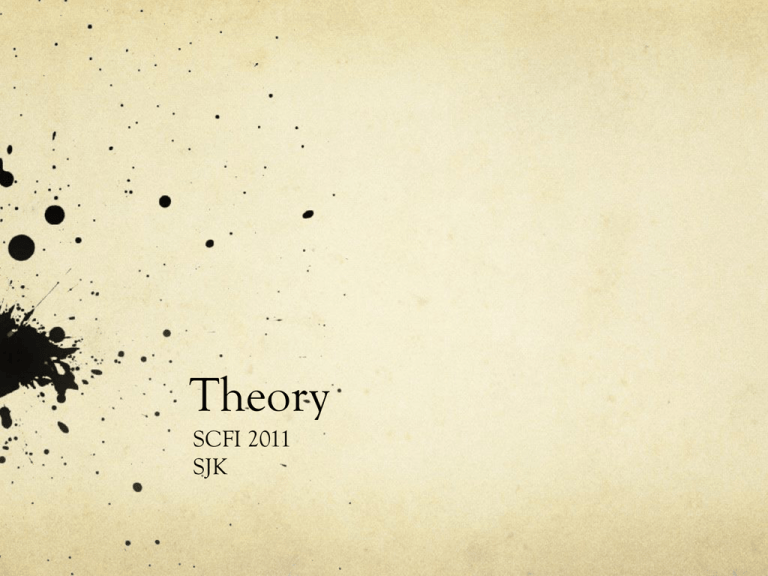
Theory SCFI 2011 SJK Lecture Objectives Understand the definition and role of theory debate Learn how to construct and write a written theory argument Learn how to answer theory arguments Understand RVIs, how to make an RVI, and how to argue against an RVI Imagine this… You and a friend are playing chess in a tournament. Your friend keeps cheating by replacing pieces that he loses when nobody’s looking or moving his pieces to other places. You lose the game. He’s breaking the rules, right? If he had not been cheating, would he still have won? Can’t know that. If the tournament judge determined that he cheated, what would happen to him? Disqualified: he loses, you win. The Role of Theory What is theory? A debate about the rules of the game We presume that both parties agree to the same set of rules and constraints on fair debate before the round begins If one party finds the argument/framework/etc of the other to be unfair for one reason or another, then theory debate is justified in order to resolve the difference of opinion regarding the rules of debate. Either the theory debate resolves (abusive arg kicked by defender) and theory is kicked by the instigator, or the judge chooses a theory winner and goes from there: Instigator wins: the judge rejects the party OR the argument that broke the rules Defender wins: Judge either can then evaluate the other args in the round or vote for an RVI if one is present The Role of Theory What theory is… A means of checking unfair arguments and discouraging cheating and shadiness Removes the incentive to run unfair arguments Goal of the unfair argument was winning rounds, but theory makes them lose rounds Pedagogical – a means of educating ourselves and others about the rules and the status of arguments as fair or unfair Gateway issue – Theory comes before anything else in the round. Remember the chess example – if someone cheats and wins, there is no way to know if he really won. A judge can’t adjudicate a round unless she knows nobody broke the rules The Role of Theory What theory is NOT… Philosophy Different meaning of “theory” in debate lexicon An easy way to win rounds Theory is difficult to learn to debate well Theory debates are very difficult to adjudicate Theory is often really sketchy because you are being unfair towards many others who might not be as familiar with theory debates in order to take advantage of them and win rounds Structure of a Written Theory Argument Is it enough to say, “This argument is abusive”? No – theory is an argument like anything else and must have the same meta-structural components of basic logic Claim Warrant No warrant, no reason to accept Implication No impact, no reason why judge votes for it Also, remember that we PRESUME that debaters agree to the rules before the round begins, so there has to be a proactive and positive reason for a judge to accept a theory argument Structure of a Written Theory Argument So, how do we write a theory argument? Constructing a theory shell A: Interpretation Recall that theory is a debate of the rules. The “A” section of a theory argument is your interpretation about what the rules of the game should be Example: “A: Interpretation – the affirmative should not be allowed to limit the resolution to just one specific state.” B: Violation Briefly explain why your opponent does not meet your interpretation of how the game should be played Example: “B: violation – the affirmative unfairly limits the resolution by only discussing one state.” Structure of a Written Theory Argument C: Standards Distinct from “Standard” in the framework sense Essentially reasons to prefer your interpretation Most important part of theory in terms of substance – where most of the debate happens about the nature of the competing interpretations. You should know every type of standard, their various strength and weaknesses, and how to argue for and against each one. Types of Theory Standards Fairness – my interpretation is the most fair Ground My interpretation provides for equal ground for both debaters His argument unfairly limits my ground His argument unfairly limits his own ground (strategy?) Time skew His interpretation skews the time structure of the round against me Predictability His argument is not something I could have possibly prepared for Research burden Outside the predictable limits of the resolution Textuality My interp most fits with the text of the resolution Grammar He defines a word in some way that is not in common usage to derive an unfair argument I define a word in a way that better follows common usage Types of Theory Standards Education My interpretation is more educational – topic-specific Depth: gives us a deeper understanding of a few specific issues Breadth: gives us broader understanding of the topic area Other education standards New perspectives Real-world education Examples of theory standards: “Parametric ACs in negatively worded resolutions annihilate negative ground and kill predictability because the affirmative can advocate a single instance of bad sanctions and win. This tanks negative ground for two reasons. First, the affirmative could choose any instance of sanctions that might be bad or harmful and advocate that they not be used. This means that the research burden is exploded – the negative is forced to research any and all sanctions policies and have answers ready, even when answers may not exist at all. Second, this kills predictability because the affirmative can shift out of both specific and generic negative advocacies by claiming they don’t apply.” “The affirmative can win based on a single, isolated incidence of sanctions and only has to prove that one instance bad. This places an impossible burden on the negative and skews ground because the negative would either have to advocate that sanctions are categorically good or answer an unpredictable advantage out of the AC advocacy.” Structure of a Written Theory Argument D: Voter Reasons to vote against your opponent on theory The most important part of the theory argument in terms of structure – tells the judge why he/she votes on theory Three basic voters Fairness: Most commonly used. Why might fairness be a voting issue? Unfair means people would leave the activity because they perceive it to be unfair, which renders the activity useless. If he broke the rules in any other game, he would lose. Hold him to the same standard here Theory encourages out-of-round solvency on fairness – educates a debater not to use the bad arg again and educates the community Education: Less common, usually in conjunction with a fairness voter. Why might education be a voting issue? Purpose of the activity is education, no education, no reason to perform the activity, people leave the activity Jurisdiction Least common. Two basic forms: Topicality-based: judge does not have the jurisdiction to judge non-topical cases Can’t judge who won the round – remember the chess example Examples of Voting Issues Voting issues that call for a loss of the offending debater: “Theory is a voter for fairness. Before substantive debate can engage the issues of the round, we must have a fair playing field on which to debate with equal ground for both competitors. Your ballot is an important pedagogical tool to prevent the use of abusive case positions on the topic. Voting against debaters that run abusive positions sends the message to my opponent not to run abusive positions again and makes the community more aware of the abuse so they won’t be so compelled to run similar cases.” Voters that call for rejection of the offending argument: “Thus, reject the parametricization of the AC and don’t let them win on a prametricized position – the affirmative should be forced to defend the resolution more generally to win the round.” Structure of a Written Theory Argument “Err” arguments Theory debates are often hard to adjudicate because debaters don’t do enough work, the debate is messy, or it’s just almost impossible to pick a winner on theory without intervening Thus, the “err” argument Essentially a little mini-theory argument at the end of a theory shell – gives the judge an easy way out of theory Tells the judge which side should be presumed to be winning the theory debate. Examples: “Err aff on theory: aff has a significant time disadvantage with the 1AR to answer the 1NC and faces a win/loss ratio skew” “Err neg on theory: aff gets the first and last speeches and gets to set the parameters for the round in the 1AC” Sometimes makes the judge’s job easier, sometimes doesn’t. But it takes 5 seconds to make this argument and it can help clear things up for some judges But Wait, Steve! “When will I ever use this? I debate on a very traditional circuit!” or “I don’t like how progressive this is!” “Traditional” debaters can be abusive as well, and there needs to be a way to check that, or you’ll lose rounds Remember, the only difference between traditional and progressive is DELIVERY! Not type of argument Modify the theory argument by slowing down, reading less of the standards, and making it less formal, maybe speaking more extemporaneously rather than reading. Debating Theory What do you do if someone runs theory against you? First of all, don’t freak out Three basic arguments that should always be present when answering theory: I meet: explain why you don’t violate their interpretation Example: “I meet: I am not limiting the debate round to one nation. I grant links to all disadvantages, regardless of whether it is specific to my parametricization.” Debating Theory Counter-interpretation – read a different interpretation about the rules that fits with your argument. This is where most of the debate happens Counter-standards – same thing as regular standards, and different reasons why you prefer your interpretation over your opponent’s Meta-weighing is important – debate over which standard is more important. Critical to winning the counter-interpretation debate Why might fairness be more important than education? Why might education be more important than fairness? Can also compare standards within those categories, like textuality vs. ground, etc. Link-turn their standards, why might you achieve their standards better? Outweigh their standards on strength of link Debating Theory Reverse Voting Issue (RVI) Two types Lazy type “Theory is a two-way street. Since it is a win-lose issue for me it also must be for my opponent to be fair and reciprocal…” Why is this a terrible argument? Non-lazy type Essentially turns the voters Discusses why this theory argument is really bad, and just forces you to unfairly spend time on the theory and avoid the real issues Example: “My opponent is just trying to make this speech more difficult for me and put me at a disadvantage by running an a priori position that I must answer no matter how ridiculous it is. This means that I am now at a structural disadvantage because I have far less time to answer the case arguments and extend, which means they can just kick theory and win the round on the flow. THIS IS A REAL ABUSE IMPACT IN THE ROUND.” Debating Theory Answering an RVI Why is the “lazy” type of RVI a terrible argument? How would we answer this argument? How can we use our “err” arguments in our favor in an RVI debate? How can you answer a “non-lazy” RVI? Legitimate and defend your interpretation Win the competing interpretation debate Use meta-weighing Things to Think About Warnings about bad theory Theory is PEDAGOGICAL, not STRATEGIC What is “bad” theory? Theory that you could run every round Theory for which you have a shell in your other expando that says the exact opposite Theory that indicts something that you yourself might run in a different round Theory that indicts things that are REALLY common and predictable (like speed) Theory for the sake of theory Things to Think About These days, theory is generally used as a bad, unfair, and squirrely way to win rounds instead of a check on actual abuse. But that’s not what it’s really for. It’s for checking abuse, not strategy You should only run theory if you seriously feel like you are being abused in the round If you feel that you want to run theory just because it’s what’s “new” and “cool,” you need to take a step back and check yourself. I know it’s fun to do the “new” and “cool” thing all the time, but consider the following: What are the consequences of running bad theory? The community becomes more used to bad theory and is more likely to use it and vote on it Good theory gets hidden in a morass of bad theory and becomes more difficult to find, making people who hate bad theory lump good theory in with it and make it less likely to work as a check on abuse, meaning abuse goes unchecked Disincentivizes making good case-level arguments, and kills education. Sorry, but you aren’t going to learn anything that will help you outside this activity by having a debate about debate every round Also, judges sometimes (often) really hate theory, because it’s hard to judge. You may suffer in speaker points or the judge’s opinion of you Final Thought At this camp, I will encourage writing and running theory occasionally, even if there’s not real abuse, so we can learn to debate it. But remember it is more important to learn to debate the case-level stuff. So write some theory, run some theory, but please don’t get so enthralled by it that you feel like you always have to run it just to be “trendy” and “cool.” Have integrity and when actually debating, use it only when you must.
